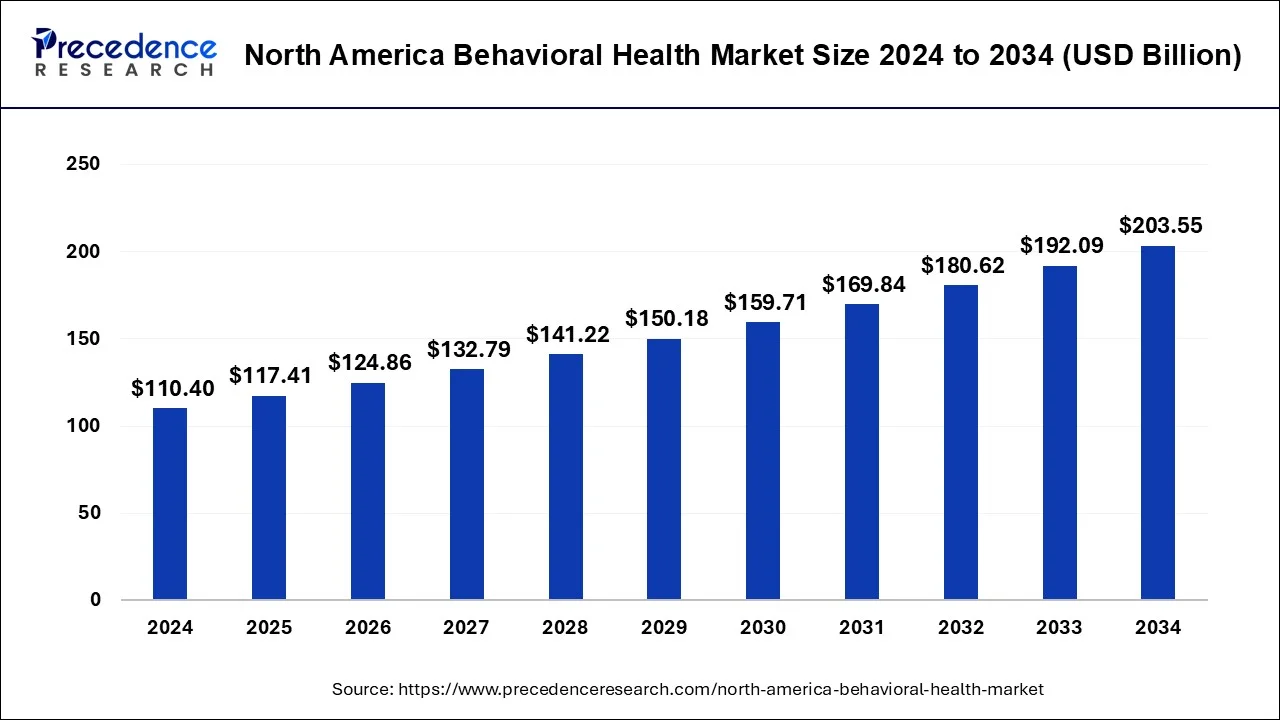he North America behavioral health market size was valued at USD 134.66 billion in 2023 and is anticipated to attain around USD 239.58 billion by 2033, growing at a CAGR of 5.90% from 2024 to 2033.
Key Takeaways
- The United States dominated the market with the largest market share of 80.96% in 2023.
- By service type, the outpatient counseling segment has contributed more than 34.05% of the market share in 2023.
- By disorder type, the anxiety disorder segment has accounted for over 47.41% of the market share in 2023.
- By end-user, the outpatient clinics segment has generated more than 36.85% of the market share in 2023.

The North America Behavioral Health Market has witnessed significant growth in recent years, driven by several key factors. The region's behavioral health market encompasses various services and treatments aimed at addressing mental health disorders, substance abuse issues, and other behavioral conditions. The market has been propelled by increasing awareness about mental health, rising demand for accessible and quality mental health services, and advancements in treatment options.
Get a Sample: https://www.precedenceresearch.com/sample/4013
One of the primary growth factors for the North America Behavioral Health Market is the growing recognition of the importance of mental health and well-being. There has been a shift in societal attitudes towards mental health, leading to reduced stigma and increased acceptance of seeking help for mental health conditions. This cultural shift has resulted in greater demand for behavioral health services across the region.
Moreover, the prevalence of mental health disorders and substance abuse issues has been on the rise in North America. Factors such as stress, trauma, lifestyle changes, and socioeconomic disparities contribute to the increasing burden of behavioral health conditions. As a result, there has been a surge in the need for effective treatment and support services, driving the growth of the behavioral health market in the region.
In addition to demand-side drivers, several supply-side factors contribute to the growth of the North America Behavioral Health Market. Advancements in medical technology and treatment modalities have expanded the range of available interventions for mental health disorders. Innovations such as telepsychiatry, digital therapeutics, and personalized medicine have improved access to care and enhanced treatment outcomes, driving market growth.
Furthermore, supportive government policies and initiatives play a crucial role in shaping the behavioral health landscape in North America. Increased funding for mental health programs, implementation of parity laws mandating equal coverage for mental health services, and integration of behavioral health into primary care settings have all contributed to the expansion of the market. These policy interventions aim to improve access to care, enhance quality standards, and promote early intervention and prevention efforts.
The North America Behavioral Health Market presents numerous opportunities for stakeholders across the healthcare ecosystem. The growing demand for mental health services has created opportunities for providers, payers, pharmaceutical companies, and digital health startups to innovate and collaborate in delivering comprehensive solutions. Telehealth platforms, mobile apps, and online therapy services have emerged as promising avenues for expanding access to care and reaching underserved populations.
However, alongside opportunities, the North America Behavioral Health Market also faces several challenges. One significant challenge is the shortage of mental health professionals, particularly in rural and underserved areas. The imbalance between supply and demand exacerbates disparities in access to care and limits the reach of behavioral health services. Addressing workforce shortages through recruitment, training, and retention initiatives is essential for meeting the growing demand for services.
Moreover, stigma and discrimination continue to pose barriers to seeking help for mental health issues in North America. Despite progress in reducing stigma, many individuals still hesitate to seek treatment due to fear of judgment or social repercussions. Efforts to destigmatize mental illness through public awareness campaigns, education programs, and community outreach are critical for fostering a supportive environment and encouraging help-seeking behaviors.
Recent Developments
- In February 2024, The U.S. Department of Health and Human Services (HHS), via the Medicaid Services (CMS) & Centers for Medicare, accepted New Mexico's request for community-based mobile crisis response teams to offer Medicaid crisis services.
- In February 2024, Tennis Canada, in collaboration with the University of Ottawa, the Canadian Centre for Mental Health and Sport (CCMHS), Own The Podium, and Game Plan, designed, implemented, and evaluated a comprehensive long-term strategy to enhance the mental health and wellness of Tennis Canada athletes, coaches, parents, and staff.
North America Behavioral Health Market Companies
- Acadia Healthcare Co.
- Universal Health Services, Inc.
- Magellan Health Inc.
- National Mentor Holdings Inc.
- Behavioural Health Services Inc.
- Behavioural Health Network Inc.
- North Range Behavioural Health
- Seton Healthcare Family (Ascension Health)
- Ocean Mental Health Services
- Beacon Health Strategies
Segments Covered in the Report
By Service
- Home-Based Treatment Services
- Outpatient Counselling
- Emergency Mental Health Services
- Inpatient Hospital Treatment
- Intensive Care Management
By Disorder
- Bipolar Disorder
- Anxiety Disorder
- Post-Traumatic Stress Disorder
- Eating Disorder
- Substance Abuse Disorder
- Other Disorders
By End-users
- Outpatient Clinics
- Hospitals
- Rehabilitation Centers
- Homecare Setting
By Country
- North America
- U.S.
- Canada
- Mexico
Contact Us:
Mr. Alex
Sales Manager
Call: +1 9197 992 333
Email: sales@precedenceresearch.com
Web: https://www.precedenceresearch.com
Blog: https://www.expresswebwire.com/
Blog: https://www.uswebwire.com/


0 Comments